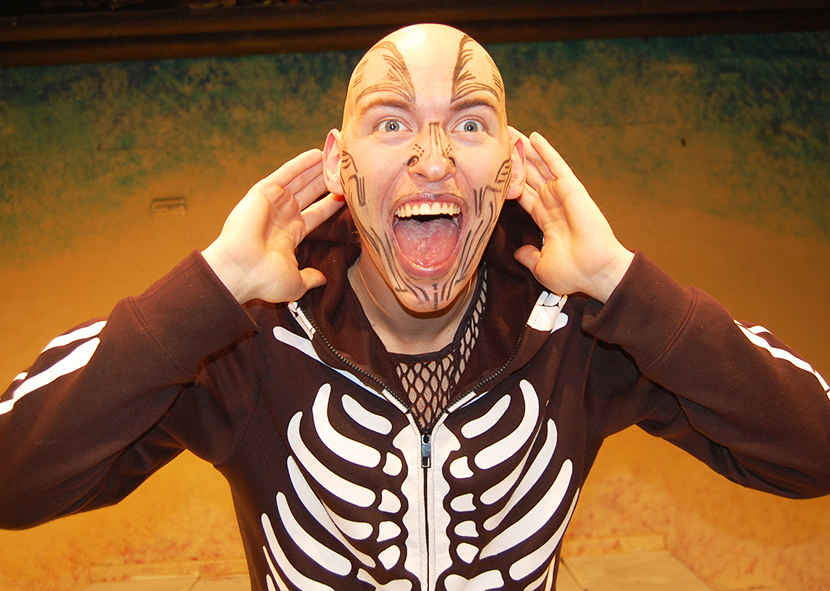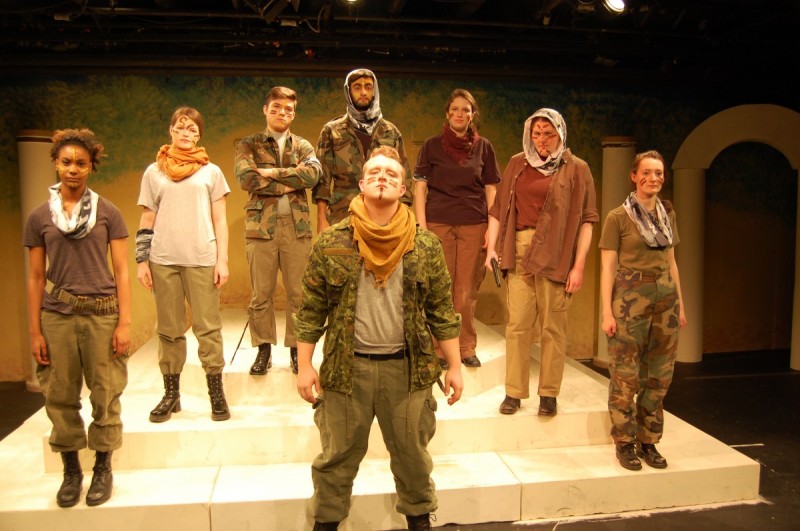
Aaron the Moor played by Nick Petuhoff in Black Hole Theatre's production of Titus Andronicus.
Black Hole opens new season with bloody Shakespeare
“Not for the faint of heart,” is how Chris Johnson describes the Black Hole Theatre‘s season opener, Titus Andronicus. The professor of theatre in the department of English, film and theatre, Faculty of Arts, is co-directing the Winnipeg premiere of Shakespeare’s bloody first tragedy with associate prof and colleague, Bill Kerr. (Scroll down for times.)
On the other hand, it’s also funny. Though audiences may be shocked by the grotesquerie of the play, says Kerr, “one of the reasons it’s being revived [for contemporary audiences] is that we’re a century that gets dark comedy.” A scene in which someone has his hand cut off, for instance, is followed by a multitude of puns about hands. Some sad soul makes hanging jokes while being led off to be hanged. The ultimate in gallows humour, you could say.
But black comedy suits them both. “We think it’s the jarring [nature] of this combination that makes it so strong. We understood that our visions of the play were compatible,” he laughs.
Johnson calls the play “raw, loud and full of frenetic energy.”
Johnson calls the play “raw, loud and full of frenetic energy.”
And the students responded to Shakespeare with “great enthusiasm,” he adds.
“I think theatre students understand that Shakespeare in high school and Shakespeare on the stage are two entirely different things.”
Highlights of the production, according to the directors?
“The actor playing Titus,” says Johnson, “is certainly interesting. He’s an undergraduate student who was a practicing architect, and [acting] had been a lifelong dream of his. After taking some lessons at Prairie Theatre Exchange, he went on from there to do some courses here at the U of M, building this into his life’s journey. He’s also just finished doing some episodes of [the locally shot TV series] The Pinkertons.”
The large, excellent cast with non-traditional casting — with the villain, Aaron, cast as Caucasian and additional people of colour in the main cast, male roles filled by females — is another strong aspect, they say.
The play’s action takes place in ancient Rome, but the Black Hole production makes it an unspecified period. After General Titus kills the favourite son of the imprisoned Queen Tamora of the Goths, her vengeance fuels a revenge cycle between the families that generates bodies stacked 13 high. Between the severed heads and enemies served up in pie — this brutal, little-produced gem may just change any preconceived ideas about Shakespeare as high-minded or flowery theatre.
Between the severed heads and enemies served up in pie — this brutal, little-produced gem may change preconceived ideas about Shakespeare as high-minded or flowery theatre.
In fact, at “an average of 5.2 atrocities per act” — as calculated by Shakespeare critic S. Clark Hulse — Titus Andronicus is relevant for our own violent times, say Kerr and Johnson.
The most challenging artistic challenge has been how to adequately stage this jarring juxtaposition, and “[how] to exploit it,” says Johnson. He notes that many people don’t recognize the power of the play until they see it on stage.
Kerr adds that the production’s unspecified era setting — with Roman costuming alongside contemporary — allows the violence of the play to be interpreted as a broader theme that violence begets violence, “continuing century after century,” as he puts it. “And the question of how children are brought up into the culture of revenge — and a culture, like the ‘civilized’ Roman one, that doesn’t see itself that way. It was the Goths who were considered to be more primitive, but really in the end, it’s the Goths that treat their children better.”
But it was also the play’s emotional force that drew them to it, and they were further influenced in their production by French poet, actor and theorist Antonin Artaud’s ‘theatre of cruelty’ — the idea that violent art could function to liberate individuals’ instincts and energies from civilization’s coercive, repressive and sickening effects.
Johnson says, “There’s something to be said for staging violence that doesn’t romanticize or apologize at all. That attempts to present violence as ugly as it actually is.”
As the play notes state, “Humanity has not outgrown blood lust, revenge and terror, not at all.”
–Mariianne Mays Wiebe
Titus Andronicus
By William Shakespeare
Directed By Chris Johnson & Bill Kerr
Staring Ian Bastin as Titus, Nick Petuhoff as Aaron, Mia Selva as Lavinia, Tasha Roth as Marta, Brendan Noyes as Lucius
Nov. 18 and 25 — 7:00 p.m.
Nov. 19 to 22 & 26 to 29 — 8:00 p.m.
The Black Hole Theatre, basement, University College
Join the cast and creative team after the performance on November 25 for a talkback session.
Tickets: $15 Adults, $12 Students and Seniors. Tickets can be purchased at the door or in advance.
Mature subject matter. Content may be offensive to some.
Reserve tickets at bhtc.ca or at 204-474-6880.








I was shocked to read the headline in the UM Today Weekly: SEVERED HEADS & ENEMIES SERVED UP IN PIE for this story promoting Black Hole’s Shakespeare season premiere…with horrific ISIS beheadings in the news all the time, this was in extremely poor taste!
We apologize for the insensitive headline in today’s Week at a Glance. It was our intent to reflect the play’s commentary on the horror of violence, and we hadn’t made that connection. According to the directors, the play reveals the ugliness of violence (and cycles of violence), and its relevance for contemporary audiences is precisely due to the kinds of violence that continue today.